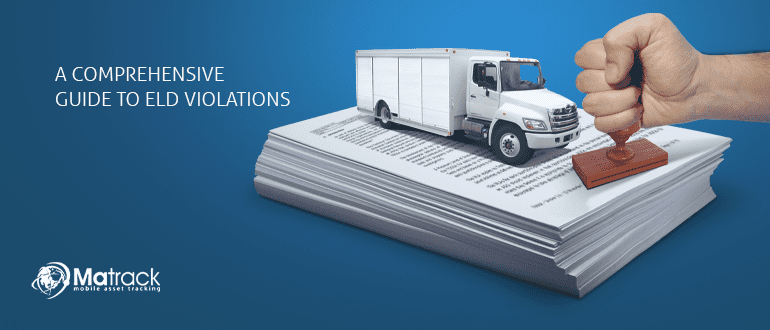Key Takeaways
- Using FMCSA-approved ELDs helps you follow the rules and avoid problems.
- ELD violations can result in significant fines, ranging from $1,000 to over $16,000, depending on the severity.
- Keeping track of HOS and checking ELD logs often can help you catch mistakes early.
- Telematics tools give real-time updates to fix issues before they turn into bigger problems.
ELD violations happen when truck drivers or companies don’t follow the rules set by the Federal Motor Carrier Safety Administration (FMCSA) for Electronic Logging Devices (ELDs).
These include using devices that aren’t approved, not logging driving hours correctly, not fixing broken devices, or failing to share ELD data during inspections.
What are ELD violations?
Failure to Use an ELD
Failure to use an ELD means a driver is not using the required device to track their driving hours. This includes using outdated systems like AOBRDs or relying on manual logs when ELDs are needed.
Using Non-Certified ELDs
Using non-certified ELDs is against the rules because these devices don’t meet the FMCSA’s standards. They may lack key features like secure data sharing or accurate tracking.
Incomplete or Inaccurate Logs
Incomplete or inaccurate logs happen when drivers forget to log changes in their duty status or leave out important details like location or time. These mistakes make the records unreliable and can lead to fines.
HOS Violations
HOS violations occur when drivers go over their legal driving limits or change their logs to hide extra hours. This often happens because of tight schedules or pressure to deliver on time.
Failure to Transfer ELD Data
Failure to transfer ELD data happens when drivers don’t know how to send their records during inspections or if the device isn’t working correctly. Without the data, companies can face penalties.
Unresolved Device Malfunctions
Unresolved device malfunctions occur when broken or faulty ELDs are not repaired or replaced within eight days. The vehicle can be taken out of service until the issue is fixed.
ELD Violation Fines
ELD violations can lead to significant financial penalties, depending on the type and severity of the infraction. These fines strain company budgets and can harm business operations and reputation.
Common ELD Violations Fines:
- Using Non-Certified ELDs: Fines for using devices not approved by the FMCSA range from $1,000 to $10,000 for each violation.
- HOS Violations: Severe cases, such as exceeding driving limits or falsifying logs, can result in fines over $16,000.
- Data Transfer Failures: If drivers fail to provide ELD data during inspections, penalties often start at $1,000 and increase with repeated violations.
- Failure to Repair Malfunctions: Using a malfunctioning ELD without repair or replacement can result in out-of-service orders, additional fines, and disrupted operations.
How to Avoid ELD Violations
Avoiding ELD violations is essential for keeping your fleet running smoothly, avoiding fines, and maintaining low CSA scores. Here are practical ways to prevent common compliance issues:
Use FMCSA-Certified ELDs
Use devices approved by the FMCSA and listed on their certified registry. These devices meet all required standards, ensuring accurate tracking and reducing the chance of violations.
Train Drivers and Managers
Teach drivers and fleet managers how to use ELDs correctly, including logging duty status changes, transferring data during inspections, and identifying device problems. Proper training ensures everyone understands their role in staying compliant.
Monitor HOS Compliance
Track drivers’ Hours of Service (HOS) in real time using telematics tools. Set up alerts to warn drivers and managers when they’re nearing HOS limits so they can plan rest breaks and avoid driving too many hours.
Conduct Regular Audits
Check ELD logs regularly to find and fix errors, such as missing entries or incorrect times. Routine audits help ensure records are accurate and reduce the risk of violations during inspections.
Create Clear Company Policies
Set clear rules for staying compliant with HOS and ELD regulations. Include steps for handling issues like broken devices or unexpected delays so drivers know how to handle these situations without breaking the rules.
Use Telematics to Stay Ahead
Telematics systems provide valuable data about your fleet, like driver behavior and vehicle use. Use this information to spot potential compliance risks early and address them before they lead to violations. Know what telematics is.
Impact of ELD Violations on CSA Scores
The Compliance, Safety, Accountability (CSA) program, managed by the FMCSA, tracks the safety performance of trucking companies and drivers. ELD violations directly impact the Hours-of-Service (HOS) Compliance BASIC, one of the key areas in the CSA program.
How ELD Violations Impact CSA Scores:
- Point Accumulation: Each ELD violation adds points to a carrier’s CSA score. Serious violations, like falsifying driving logs, carry higher point penalties than minor infractions.
- Inspection Results: ELD violations found during roadside inspections hurt your CSA score. Frequent issues increase the likelihood of being flagged for non-compliance.
- Carrier Profile: A high CSA score means the company is considered risky and non-compliant. This can lead to more FMCSA audits and interventions, potentially losing contracts or higher insurance costs.
Also See: How to Check CSA Scores for Drivers?
Conclusion
ELD compliance is important to avoid fines and keep your business running smoothly. Violations can harm your reputation and increase your CSA score, making it harder to succeed.
Using reliable solutions like Matrack ELD, training drivers, and following clear rules can help prevent these problems. Staying proactive keeps your fleet safe, legal, and efficient on the road.


